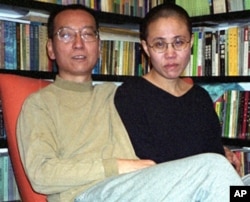Liu Xiaobo is a 54-year-old writer and veteran of pro-democracy campaigns in China. Liu has been in and out of Chinese prisons over the past two decades because of his outspoken advocacy of human rights and political reform.
Convicted of subversion
The newest Nobel Peace laureate, Liu Xiaobo, is not likely to be able to accept his prize in person – he is serving an 11-year sentence in a Chinese prison.
|
CHINESE REACTION |
|
VOA Beijing - Stephanie Ho
|
Chinese authorities last December convicted Liu of subversion, but gave no details of which Chinese laws he violated. He was detained a year before that, in December 2008, shortly before the publication of Charter 08 – a manifesto he helped draft that calls for sweeping political reforms.
One of the original Charter 08 signers was 77-year-old Bao Tong, who says he thinks a Nobel Prize for Liu is a great thing for China.
Bao says through Charter 08, Liu is calling on the government to be responsible to the country's Constitution and to be accountable to Chinese people. He describes this effort as a contribution to world peace.
Bao is the highest ranking Chinese official to have served time in jail following the bloody government crackdown on demonstrators near Tiananmen Square in 1989.
In and out of prison over two decades
Liu also spent time in prison for his involvement in the 1989 protests. He was jailed again later for writings that questioned China's single-party political system.
Wife humbled by Nobel decision
Liu's wife, Liu Xia, says she has been moved by all the support she received throughout her husband's candidacy. Since he has been imprisoned this time, she has been allowed to visit him once a month.
Liu says her husband is always in good spirits, but has health problems, including hepatitis.
Some Chinese dissidents show no support
Support for Liu was not universal. Some Chinese dissidents living overseas opposed his candidacy for the Nobel, and wrote an open letter accusing him of maligning fellow activists and not being tough enough on China's leaders.
The Chinese government also was clear in its opposition to Liu's candidacy. At a recent briefing, Foreign Ministry spokesman Jiang Yu did not say Liu's name, but said he is not appropriate for a Nobel Prize because he is a lawbreaker.
Jiang says she believes the Nobel Peace Prize should be awarded to people who work to promote ethnic harmony, global friendship or arms reduction.
Support from other human rights advocates
One of the highest profile international pledges of support came from Czech playwright and former president Vaclav Havel, who praised Liu's "unflinching and peaceful advocacy for reform." Charter 08 was modeled on Charter 77, a manifesto that was a rallying document for activists in the former Czechoslovakia.
American lawmakers also have called on President Obama to raise Liu's case when he meets Chinese President Hu Jintao at the G-20 summit in November.
Patrick Poon, of the Independent Chinese PEN Center, an organization of writers, says he thinks the Nobel will raise greater interest in Liu's ideas inside China.
"We feel like it will give a very strong influence on attracting new people to look at what Charter 08 is about, and also to read Liu Xiaobo's writing," Poon said.
Charter 08 was initially signed by about 300 intellectuals, lawyers, peasants and workers. The document has circulated on the Internet, and now has 10,000 signatures.
Wife helps keep up his spirits
Liu's wife says although her husband is incarcerated, he still reads all sorts of books, except political publications, and is still writing.
She says she brings Liu notebooks and pens, so that he can carry on his writing.
She says, however, she is not allowed to talk to Liu about things that happen in the outside world.







